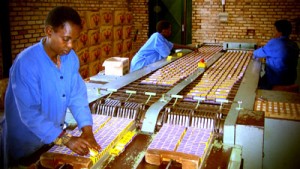The ‘rise of the South’ a reason for hope

Small business in Rwanda
There are thousands of people fleeing conflicts in Syria, Iraq and Afghanistan; there is continued widespread violence in South Sudan and Somalia. There continues to be unbridled sectarian fighting in Nigeria, the Central African Republic, Mali, and the Congo and no let-up in the interminable Israeli-Palestinian conflict.
With all this, you might be excused for thinking the political and economic outlook for the developing world is grim. But, you’d be wrong.
The rise of the developing world is radically reshaping the globe with nations from the so-called ‘South’ driving economic growth, lifting hundreds of millions of people out of poverty and propelling billions more into a global middle class.
These are the findings of the United Nation’s most recent Human Development Report.
“The rise of the South is unprecedented in its speed and scale,” says the 2013 report, titled ‘The Rise of the South: Human Progress in a Diverse World’.
“Never in history have the living conditions and prospects of so many people changed so dramatically and so fast,” the report says.
The improvement in so many people’s living conditions goes beyond the well-documented economic growth achieved by countries like India, China and Brazil.
The report shows that more than 40 developing countries have made greater human development gains than predicted.
These advances, the report says, are due to sustained investment in education, health care and social programs as well as open engagement with an increasingly interconnected world.
UN Development Program Director and former New Zealand Prime Minister Helen Clark says there is hope these achievements can be sustained into the future.
“The report makes a significant contribution to development thinking by describing specific drivers of development transformation and by suggesting the future policy priorities that could help sustain such momentum,” Ms Clark said.
“The South as a whole is driving global economic growth and societal change for the first time in centuries,” she said.
The report projects that by 2020, the combined output from the three leading South economies – China, Indian and Brazil – will surpass the aggregate production of the United States, Germany, the United Kingdom, France, Italy and Canada.
The report said that the proportion of people living in extreme income poverty worldwide plunged from 43 per cent in 1990 to 22 per cent in 2008, including more than 500 million people lifted out of poverty in China alone.
Developing countries nearly doubled their share of world merchandise trade from 25 per cent to 47 per cent between 1980 and 2010, the report says. Trade within the South was the biggest factor in that expansion, climbing from less than 10 per cent to more than 25 per cent of all world trade in the past 30 years – while trade between developed countries fell from 46 per cent to less than 30 per cent, it said.
The South is increasingly interdependent and interconnected. Mobile phones with internet links are now found in most households in Asia and Latin America, and in much of Africa. Brazil, China, India, Indonesia and Mexico now have more daily social media traffic than any other country except the US.
The South’s growing global interconnections are personal as well as virtual; migration between developing countries recently surpassed net migration from South to North, the report says.
It says that ambitious, well-conceived policies can sustain this human development progress in coming decades and expand it to reach more developing countries.
But the report warns the South faces long-term challenges – many of these are shared with industrialised nations – and include an ageing population, environmental pressures, social inequity, mismatches between educational preparation and job opportunities and the need for civic engagement.
“These require both national and global solutions if developing countries are to maintain the human development momentum,” the report says.
It warns that environmental inaction, especially regarding climate change, has the potential to halt or reverse the progress achieved in the ‘South’. The report says the number of people in extreme poverty could increase by up to three billion by 2050 unless environmental disasters are averted by coordinated global action.
The report also focuses on education saying that giving women educational opportunities through to adulthood is the “closest thing to a silver bullet” formula for accelerating human development.
It says this historic progress is in turn creating opportunities for new partnerships between developing and developed countries to confront shared challenges such as climate change and to cooperate in new ways to speed human development elsewhere in the world.
Laurie Nowell
AMES Senior Journalist












